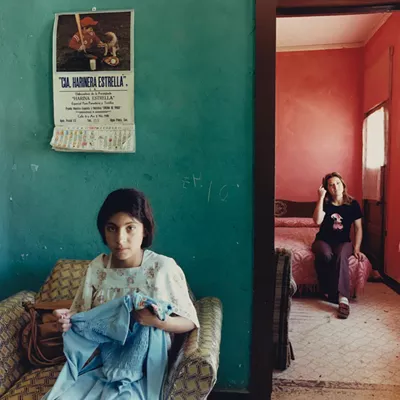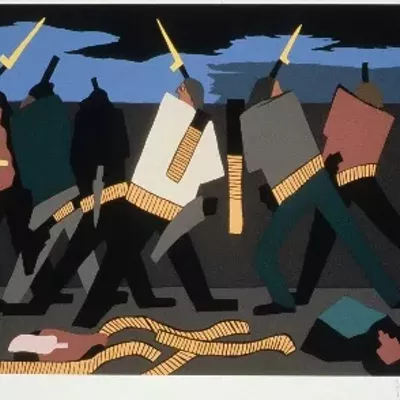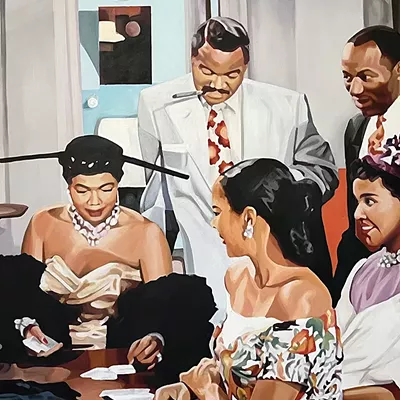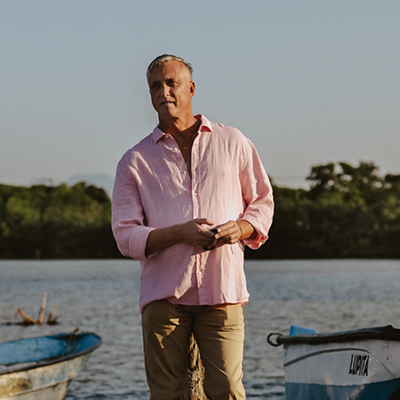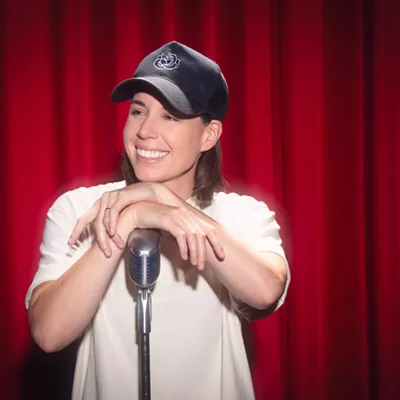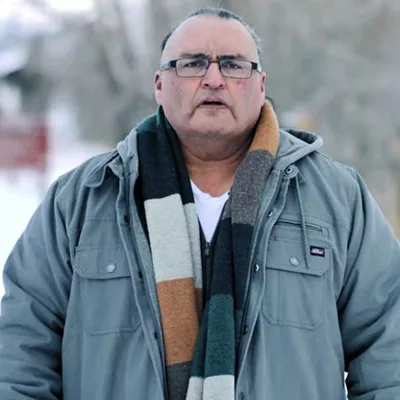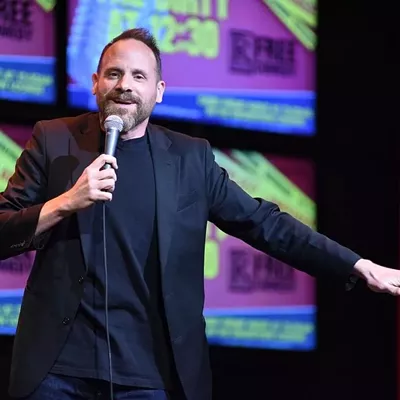A bevy of Australian musicians is landing in Tucson this week to star in the weeklong 15th Tucson Winter Chamber Music Festival. The four members of the Synergy Percussion Quartet--all percussion, all the time--are lugging their drums and other percussive instruments to the Old Pueblo, and Aboriginal musician William Barton is bringing along his didgeridoo, the indigenous woodwind instrument. These Aussies are just five of the 17 musicians who will play throughout the concert-packed week, but they'll give a distinctive Down Under twist to the acclaimed annual festival of classical music.
"A lot of the music is Australian," enthuses Jean-Paul Bierny, president and all-around booster for 31 years for the Arizona Friends of Chamber Music, the festival sponsor. And much of that music will be new to American ears. "You'll recognize some of the names on the program--Bach, Schumann, Beethoven, Schubert, Mozart--but there will also be a lot of music from composers nobody here has heard of."
The festival took an Australian turn after its music director, cellist Peter Rejto, moved Down Under about three years ago. A former professor at the UA and at Oberlin, Rejto quickly immersed himself in the contemporary-classical scene in his new home.
"He met musicians, went to concerts and festivals, met composers, quartets, didgeridoo players," Bierny reports. "He was bowled over."
Australian composers are discovering their continent's indigenous music, Bierny says, just as European composers in the early 20th century--think Dvorák and Bartók--started "using traditional music from their homeland. The same thing has developed in Australia. They found their own voice. The music is very original and very good."
On the festival program are works by Australian composers Ross Edwards ("He is fantastic," Bierny proclaims) and Peter Sculthorpe ("maybe the best-known living composer in Australia"). Didgeridooist Barton, the "best Australian Aboriginal player," has worked with Sculthorpe, who incorporates didgeridoo into some of his orchestral works.
With such innovations, Bierny hopes, "This festival will be exciting for young people especially."
In honor of their first American visit, the two Australian acts volunteered to perform an extra concert, on Monday evening, when the festival normally goes dark. The music will be all Australian, by such composers as Michael Askill, Nigel Westlake, Martin Wesley-Smith, Edwards and Sculthorpe.
Other first-time festival musicians include the Borealis String Quartet, baritone singer Christopheren Nomura, cellist Antonio Lysy and violinists Lara St. John and Ian Swensen. Previous festival favorites are pianists Bernadene Blaha and Kevin Fitz-Gerald, violist Paul Coletti and oboist Gerard Reuter.
The week of concerts at Leo Rich--six in eight days--marks a trio of anniversaries for the Arizona Friends. The group is celebrating its 60th season of bringing high-quality classical music to Tucson, 15 years of staging the festival extravaganzas and 10 years of commissioning new work.
This year, audiences will witness the world premiere of two works, at the opening and closing concerts.
The Borealis String Quartet will debut a string quartet by Kelly-Marie Murphy, a young Canadian composer, at this Sunday's matinee. Edwards' brand-new Tucson Mantras, played by no fewer than nine musicians, including the Synergy Percussion Quartet and Barton, will be the festival's grand finale on Sunday, March 9.
The commissioning program, unusual for a local chamber-music society, began after Bierny and his board noticed that the postwar trend toward atonal music was waning.
"Music started going back to tonal, to some form of melody. It's contemporary-sounding, but more palatable to the audience. It's something we wanted to be part of."
In the last 10 years, individual members of the Friends audience have paid for composers to write no fewer than 40 new works; 32 have been performed, and eight are still to be heard.
"Some continue to be played, some more than others. Some are on CDs, and some have been published as scores, and made available to other musicians."
As usual, the festival invites the community in for free open rehearsals in the theater from 9 a.m. to noon, on Monday, Tuesday, Wednesday, Friday and Sunday, March 9. Thursday morning is reserved for a schoolchildren's concert. Saturday, March 8, master classes in violin at 3 p.m. and in piano at 4 p.m. are also free and open to the public.
"This is all part of our educational-outreach program," Bierny says.
Despite the headaches associated with the festival--the overseas flights of those Australian instruments were the subject of frantic phone calls one afternoon last week--Bierny is delighted with the program.
"We're going all out for our 60th anniversary," he says. "The other festivals have been uniformly superb. This will be, too, and it's bigger."
Plus, he's made friends long-distance with Barton, master of the didgeridoo.
"As of yesterday, he calls me mate."
The 15th Tucson Winter Chamber Music Festival takes place with concerts at 3 p.m., Sunday, March 2; 8 p.m., Monday, Tuesday, Wednesday and Friday, March 3-7; and 3 p.m., Sunday, March 9, at the Tucson Convention Center's Leo Rich Theater, 260 S. Church Ave. A gala dinner and recital at the Arizona Inn begins at 6 p.m., Saturday, March 8. James Reel (the Weekly's arts editor) will offer pre-concert commentary one-half hour before the concerts. Tickets are $25; student rush tickets are $10; gala dinner and recital tickets are $150. For tickets or for more information, visit 577-3769; for complete concert programs, see the Chamber Music Web site.

